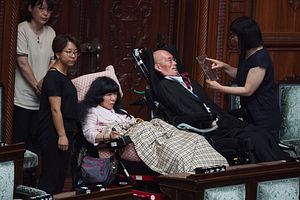The number of women and disabled lawmakers who won seats in this summer’s upper house election on July 21 was hailed as a victory for parliamentary diversity. From 370 female nominees, a record 104 women were elected, a ratio of almost 30 percent. While the increase appears hopeful for gender equality, on closer inspection, the success rate was lower than the previous election in 2016.
This was the first national election since the Gender Equality Promotion Act was enacted in 2018. The act sets a non-binding quota, urging political parties to balance female and male candidates by setting numerical targets. But women’s inclusion rates between political parties show mismatched efforts. The Constitutional Democratic Party, Social Democratic Party, and Japanese Communist Party stood out with 45 percent, 71 percent, and 55 percent female candidates respectively. In contrast, Prime Minister Shinzo Abe’s ruling Liberal Democratic Party (LDP), which stresses “a society where all women can shine,” put forward only 12 female candidates, making up 15 percent of its total candidates.
Although women in Japan achieved suffrage 74 years ago, Japanese politics has failed to change considerably. Female political participation in Japan’s national assembly remains at a dismal 165th place among 193 countries — the lowest among G-7 and G-20 major economies. Six years into Abe’s pledge to raise the proportion of women in leadership positions in society to 30 percent by 2020, Abe recognized the lack of female representation on the night of the LDP’s upper house election win. He pledged to “do my best to put forward more female candidates in the next election” and added he would “reflect on the strength of women when choosing new candidates.”
Women’s political empowerment starts with the ability to influence issues of special concern to women, such as pregnancy, childbirth, child care, single motherhood, and sexual harassment. The lack of women in parliament historically has been cited as the reason behind Japan’s runaway population decline. While the upper house elections produced sluggish voter turnout — the lowest since World War II at 48.8 percent — in general women tend to exercise their right to vote more than men. In Niigata, Miyagi, Akita, Shiga, Mie, and Ehime prefectures, female candidates beat male candidates thanks to the overwhelming support of women in their 30s.
But the number of Japanese women wanting to enter politics could be much higher. Some scholars suggest the low ratio of women in politics is linked to opposition from immediate family members, which can deter women from standing for election. An age quota among female legislators has also been suggested as a way to counter increasing parliamentary lifespans – there is a view that some female legislators who reach 60 tend to overlook child rearing issues in favor of unifying party policies.
Meanwhile, last week, two new politicians who are both severely handicapped made their arrival at the first Diet plenary session, signaling a new chapter of political participation for Japanese people with disabilities. Both Yasuhiko Funago and Eiko Kimura are paralyzed from the neck down and rely on reclining electric wheelchairs. While there have been legislators who have used wheelchairs in the past, Kimura and Funago are the first severely physically disabled politicians to join the upper house to advocate for the better integration of disabled people. Both members ran for a new left-wing minority party called Reiwa Shinsengumi, launched in April.
To accommodate the new members, the parliament building entrance underwent barrier-free renovations, adding a slope connecting directly to their seats. When conducting legislative activities, as both lawmakers are unable to move their hands freely, nursing assistants help conduct conversations through a computer system operated by a sensor. As an alternative to traditional hand raising to count votes, a push button voting system has been introduced.
Also on the agenda is deciding the logistics for the Diet question and answer time in autumn, when bill deliberations are expected in the extraordinary Diet session. Currently, the parliamentary steering committee is considering having nursing assistants serve as a substitute for questions and answers.

































